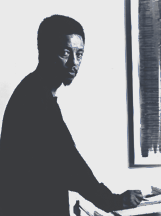Making His Move
Sounding Out the Possibilities: The world and all its parts inspire the complex compositions of saxophonist Henry Threadgill.
Jazzman Henry Threadgill opens wide the doors of musical perception on 'Makin' a Move'
By Nicky Baxter
ANY AND EVERYTHING informs composer/saxophonist Henry Threadgill's musical palette. The way a shadow drapes itself over a building in Holland. A piece of architecture's shape--or what it's made of. A circus performance. Odd? Maybe. But that's the way Threadgill has always perceived the world/music. Nothing stays the same. There are too many possibilities to be considered--too many ways see, hear and play music, to play at life.
Makin' a Move (Columbia), Chicagoan Threadgill's most recent release, is, then, aptly named. The album is about ways of perceiving disparate things and ideas. It's about motion, evolution. Sure, you can hear this music, but you can "see" and feel it as well. And, no matter how varied its permutations, Makin' a Move never stops making sense. Make that "senses."
Once again, the group known as Very Very Circus, which was heard on last year's Carry the Day, is Threadgill's principal vehicle. Mark Taylor (French horn), Brandon Ross and Ed Cherry (electric guitars), Edwin Rodriguez and Marcus Rojas (tubas) have returned to flesh out their boss's concepts. A relatively new member of Threadgill's Circus, Pheeroan Aklaff (yet another unheralded liberation-music artist) performs on drums.
This ensemble plays on four of the seven tunes. The other three tracks feature, respectively, an acoustic piano and guitar quartet; an alto saxophone and cello trio; and, finally, a mating of cellos and guitars. These latter compositions greatly resemble traditional chamber music; they are, quite literally, "black classical music."
Of the various groupings, Very Very Circus generates the most excitement. Which, by the way, does not mean they're dumbed down boogiemen--far from it. "Like it Feels," "Official Silence" and "Dirty in the Right Places" reconnect African diasporan music's head and body. There's nothing random about the music. Right from its stutter-step drum introduction, "Like It Feels" roils with restless energy and polyrhythms that shift constantly, now rising in intensity and meter, then easing off, not quite static but out of your face for the moment. And then it's back to vertical rock again. Predictably, the two tubas don't indulge in straight-time oompah shtick. Rather, the instruments are used to up the ante in terms of dynamics.
Even as they chip in with a little bassy groundwork, Rodriguez and Rojas are not reduced simply to providing a groove. They offer as well a significant countrapuntal element, bouncing off what the other instruments are doing. Each tuba note blown is essential to the mix; the big brass instruments may be elephantine in size, but on "Like It Feels" and other cuts, they produce a sound as lean as a strip of filet mignon.
THE OTHER HORN players don't bother trying to hog the show. This is communal art; the musicians' mission is to unite--not fight one another for supremacy. Yet there is space for individual expression here.
Be alert, and you can catch snapshot-quick solos. Still, that self-expression is inextricably linked to what's going on around it. Again, "Like It Feels" is an excellent illustration of that musical (/social) principle.
Makin' a Move offers other examples of how musicians work it out together. "Make Hot and Give" is built on the idea from the bottom up. There are at least three layers operating here. On the down-low level, Rodriguez and Rojas' tubas function as subterranean agents provocateurs, slyly bumping up the levels of intensity. Steadfastly rhythmic and melodic, the tubas give off the impression of constant circular motion.
At the high end, Threadgill and guitarists Ross and Cherry hook up for some whimsical "olde" English royal court fanfare. Between those polar points, Taylor's French horn acts as an intermediary, yoking the two ends together with flowing, becalmed passages.
Threadgill's playing is, as ever, brilliant. By turns elliptical, elegant and deeply romantic, he possesses a rare gift. There are only a smattering of alto players who have successfully plucked the instrument from the grips of Parkermania. Threadgill is one of them.
From his horn issues a steady stream of invention, and as he is inspired by everything around him, you're likely to hear that vastness in any given solo. Even when he sets his sax aside (as happens on "Noisy Flowers" and "The Mockingbird"), what you're hearing is the musician's real life--which has nothing to do with imposed divisions between people, places and things.
[ Metro | Metroactive Central | Archives ]
This page was designed and created by the Boulevards team.

Roger Tully
From the July 3-10, 1996 issue of Metro
Copyright © 1996 Metro Publishing and Virtual Valley, Inc.
